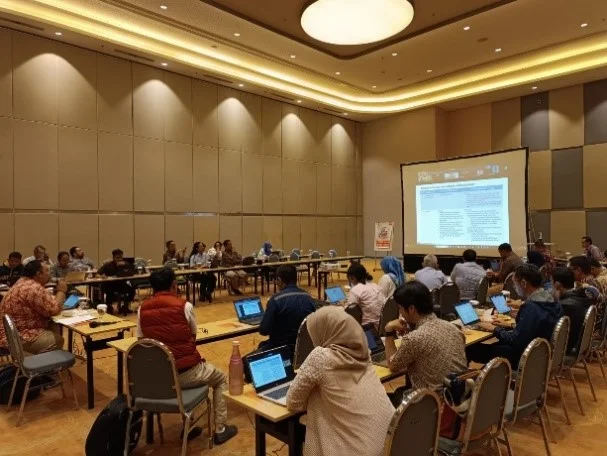
SETI (Sustainable Energy Transition in Indonesia)
Status
Ongoing
Overall Project Duration
Commissioner
International Climate Initiative (IKI)
Political Partner
Cooperation Partners
Implementing Organization
GIZ
Project page on organization website
Project Documents and Links
- N/A
Background
Indonesia has set bold climate and energy targets, aiming to reduce greenhouse gas emissions by 32% (unconditional) by 2030, achieve a 23% renewable energy share in the national mix by 2025, and reach net-zero emissions by 2060 or earlier. The Just Energy Transition Partnership (JETP) has further raised these ambitions: targeting a 34% RE share in the power sector by 2030 and peaking emissions from the sector that same year.
Despite this ambition, significant gaps remain. The industry and buildings sectors together account for nearly 40% of Indonesia’s total GHG emissions, yet adoption of renewable energy (RE) and energy efficiency (EE) measures in these sectors remains limited. On the demand side, industries often lack technical know-how and access to financing for decarbonization, while local governments struggle to promote low-emission buildings due to capacity constraints.
SETI addresses these challenges by enabling structural transformation in the energy consumption of industrial and urban systems. The project leverages Indonesia’s political commitment by providing technical support, capacity development, and financing facilitation for EE and RE measures in these two critical sectors. SETI also ensures that decarbonization efforts in the demand-side ecosystem are aligned with local and national development priorities.
Project Approach
SETI adopts a demand-based ecosystem approach that emphasizes practical implementation, coordination across ministries, and localized action. The project works with stakeholders at different levels—ministries, city governments, industry associations, and businesses—to co-design solutions that are context-specific, scalable, and replicable.
In the industrial sector, SETI facilitates the development of energy efficiency guidelines, RE integration frameworks, and pilot projects to demonstrate technological and financial feasibility. The project supports the creation of “Industry Energy Labs” where manufacturers can assess decarbonization pathways and access matchmaking services with clean tech providers.
In the built environment, SETI collaborates with cities to create net-zero urban development roadmaps, including energy audits for municipal buildings, training for building managers, and promotion of green construction practices. Local Energy Labs provide space for cities to test innovations and institutionalize sustainable energy solutions into urban governance.
Capacity building lies at the core of the approach—training modules, technical workshops, and stakeholder dialogues are delivered to address gaps in technical knowledge, regulatory coherence, and investment readiness. The project also works closely with MEMR and PUPR to support derivative regulations for PP 33 on Energy Management, and to explore how carbon pricing or climate finance can unlock new investment streams for EE and RE adoption.
Desired Impacts
SETI aims to reduce emissions from Indonesia’s highest-emitting sectors by embedding RE and EE into industrial and urban systems. By demonstrating successful interventions through pilot projects and case studies, the project creates blueprints for replication across the country.
It strengthens the technical and institutional capacity of ministries, city governments, and private companies to plan and implement energy transition measures. The project also enhances local ownership by working with “industry champions” and pioneering cities that are willing to lead by example in low-emission development.
Through its matchmaking component, SETI enables connections between solution providers and investors, de-risking RE and EE financing in the building and industry sectors. This support extends beyond technical deployment—it fosters public awareness, mobilizes financing, and unlocks systemic change.
In the long term, SETI will contribute significantly to closing the implementation gap between Indonesia’s climate commitments and actual on-ground impact—moving from high-level pledges to actionable, city- and industry-led decarbonization.
Project Activity Areas (Outputs)
Policy Development
Capacity Building
Support for Pilot Cities and Industry Champions to achieve sustainable energy
Financial Instrument Support
Project Publications
Project Updates
Tools
SEA Information Platform for the Energy Transition (SIPET)
The Southeast Asia Information Platform for Energy Transition (SIPET) is a one-stop platform for information and knowledge exchange about the energy transition in the region. SIPET aims to be a central launch pad for energy transition stake holders to facilitate dialogue and promote coordination in the Southeast Asia power sector.
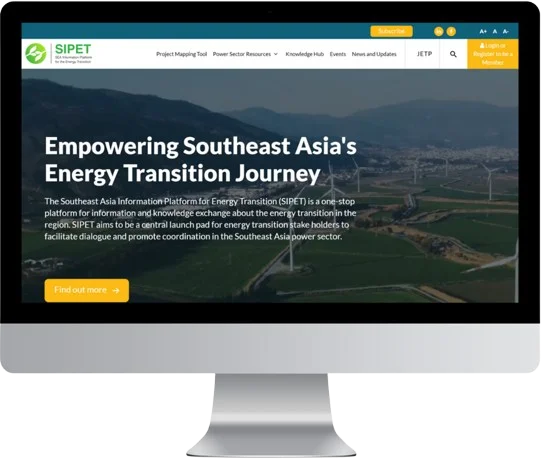
Bio DB
BioDB is a useful website for providing general information, encouraging discussion and conversation on the topic of bioenergy from agro-industrial waste. The data and information presented were collected by the Strategic Exploration of Economic Mitigation Potentials through Renewables (ExploRE) project, a project funded by the Federal Ministry for the Environment, Nature Conservation and Nuclear Safety (BMU), Federal Republic of Germany, in collaboration with the Ministry of Energy and Mineral Resources (ESDM) of the Republic of Indonesia, and implemented by the Deutsche Gesellschaft für Internationale Zusammenarbeit (GIZ)
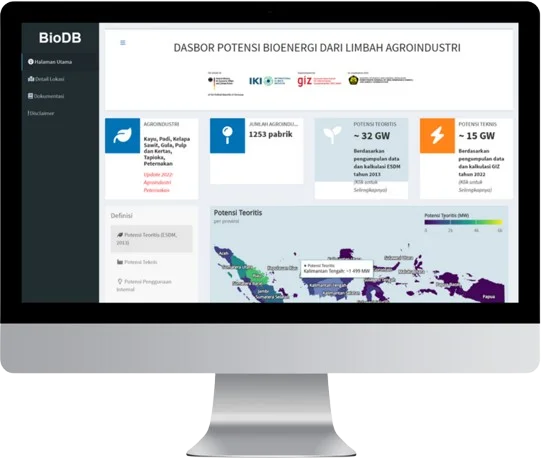
IKI JET
The global energy transition away from coal to renewable energy is threatening local livelihoods, economic activities and jobs, but also holding opportunities for sustainable, low carbon development. The project aims at supporting key stakeholder of coal regions to plan for and implement regional just energy transition pathways away from coal and towards a low-carbon energy system. Focusing on the regional economic transformations, the project works with government, industry, unions, communities, civil society, and academia. It supports interregional peer-to-peer exchange, learning, and policy dialogue in an international network and information sharing via a knowledge hub. In Indonesia, it supports the development of specific transition plans in two coal regions. In Colombia, it supports the development of the concept and framework for energy communities and the implementation of just and inclusive energy communities in César and la Guajira.
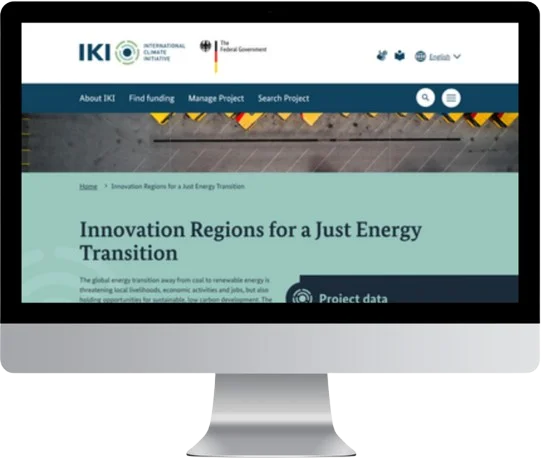
CASE for Southeast Asia
The “CASE for Southeast Asia” website is dedicated to the promotion of clean, affordable, and secure energy transitions across Southeast Asia. The website focuses on the provision of resources, the conducting of research, and the facilitation of collaborative projects in countries such as Indonesia, Thailand, the Philippines, and Vietnam, with the aim of supporting energy transition efforts. The platform highlights the challenges and opportunities in the region’s energy sector, while sharing knowledge, best practices, and policy recommendations aimed at advancing the transition to renewable energy and sustainable development
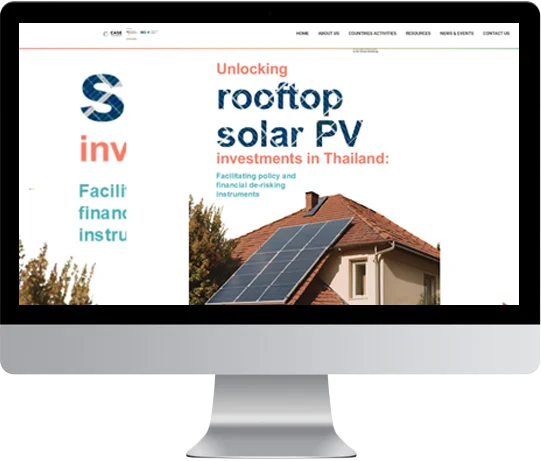
Contact
Project Address
De Ritz Building, Floor 3A
Jl. HOS Cokroaminoto No. 91, DKI Jakarta, Indonesia
Dr. Johannes Anhorn
Implementation Manager SETI


